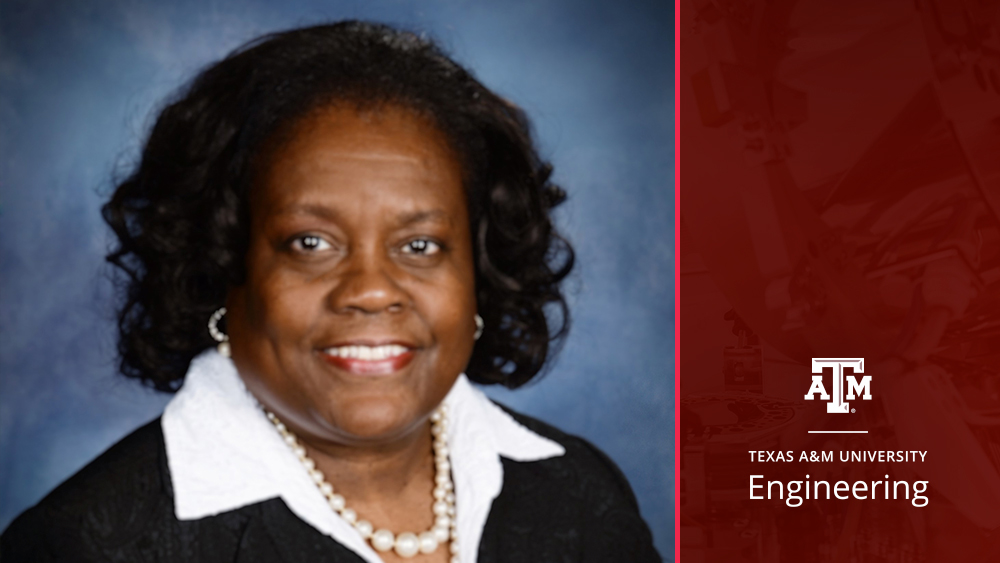
In the heart of Houston, the class of 1975 at Forest Brook High School was gearing up for the start of their post-graduation journeys. While some dreamed of becoming doctors, lawyers or teachers, valedictorian Annie Carter knew she was destined to become an engineer. Not only would she later achieve that goal, but she would also make Aggie history as the first African-American female to earn her civil engineering degree from Texas A&M University.
Since elementary school, Carter always remembered being asked what she wanted to do with her life. Through all of her classes and electives, she quickly found a passion and love for science and math.
“I was always fascinated by science and math,” Carter said. “I just found that they had the answer to so many things in life.”
During her senior year, Forest Brook High School invited top engineering companies to come in and recruit students into the engineering field. Carter recalls not looking like the engineers that visited her and her class, but that was never a concern to her.
“I just kept thinking, ‘How do you get to this amazing career where you get to solve problems and be inquisitive and do it over and over again?’” Carter said. “My main question was usually, ‘What university did you attend?’”
Above all other answers, two schools were continuously mentioned in her search to find a starting point for her career: The University of Texas and Texas A&M. As Carter started her applications to the two universities, she calculated the cost of attendance down to the last dollar to decide where she would go. Carter added up the total of all of her grants and scholarships and finally landed on a decision.
“I still remember to this day that the University of Texas was about $600 more per semester,” Carter said. “Based on that, I decided Texas A&M was where I was going to go.”
With where to attend school settled, Carter had one last thing to square away to officially start her college career — what would be her major? Before moving to Houston at the age of three, Carter and her family lived in southern Louisiana, where the roads between Louisiana and Texas were littered with refineries that sparked her interest.
“I was just always fascinated by the refineries and the chemical plants on I-10 between Houston and Louisiana,” Carter said. “It was like, ‘Oh, wow! What goes on there? It looks like a magical place!’”
Carter wanted a major that would satisfy her desire to be in a comprehensive field that would allow her to work in the oil and gas industry. Through searching and finding a new interest in construction, Carter officially started her college journey as a civil engineering student in the Fightin’ Texas Aggie class of 1980.
“I felt like I was crafting my own career,” Carter said. “When I started interviewing for jobs after graduation, at that time, not as many of the oil and gas companies were hiring civil and environmental engineers. But with the courses I had taken, it was a good fit.”
Carter remembers the beginning of her time at Texas A&M being challenging, but a challenge she could not get enough of. To her, Texas A&M provided courses and scenarios that were as close as she could get to real-world experience. The constant problem-solving, question-asking and open-mindedness she needed in school were some driving factors that led her to a successful career.
While attending university, Carter was also one of 10 students that founded the National Society of Black Engineers chapter at Texas A&M. The organization focuses on increasing the number of successful and culturally responsible black engineers in academia and industry.
After completing her bachelor's degree, Carter began her career with Gulf Oil, where her desires to become a problem solver and have a career that pushed her intellectually were finally fulfilled. She served the company in numerous ways, such as leading multi-million dollar capital projects and holding a variety of positions with increasing responsibilities in the areas of operations, construction, training, safety and project management.
“Eighty percent of your day was tasks that you had planned to do, and the other 20 percent was often something you never thought of,” Carter said. “Someone would step into your office and say, ‘What is this?’ or ‘How do we solve this?’ or ‘What do we do about this issue?’”
Along with her robust career with Gulf Oil, Chevron and Chevron Phillips, Carter also found a passion for giving back to her community through the Texas Alliance for Minorities in Engineering (TAME) program. Carter has spent many years working with TAME, leading learning sessions and camps, supervising STEM competitions, providing mentorship to students entering the engineering field and so much more.
For the last 40 years, Carter has had an undying passion for the students impacted by the TAME program. Since 2006, she has served in various leadership roles for the program and is the current chair for TAME’s Golden Triangle (GT) Chapter.
“It’s a great way to stay engaged by trying to get more students interested and inspiring them to be future engineers,” Carter said.
Carter’s story is one of determination, passion and generosity. From an early age, she understood her passions and was determined to make those dreams a reality. From becoming the first African-American woman to graduate from Texas A&M’s civil and environmental engineering department to now being the chair for GT-TAME, Carter has truly lived a life that is not only accomplished, but one that has forever shaped the future of engineering.